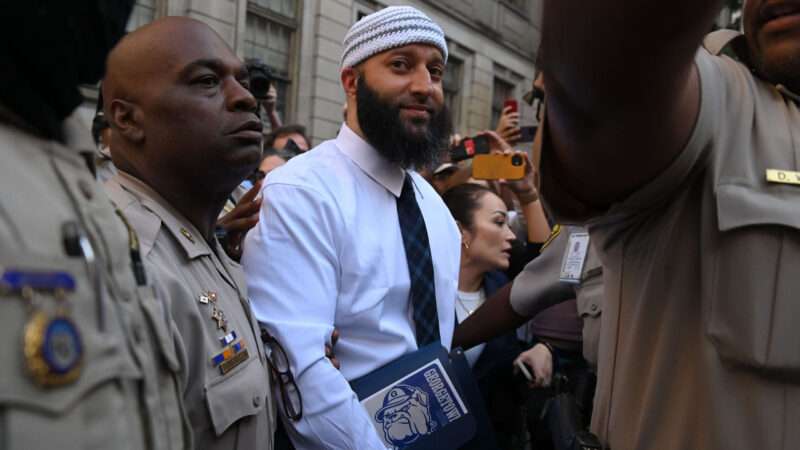
In 2016, Adnan Syed—the man who was convicted in 2000 of murdering his high school classmate Hae Min Lee—was offered a new trial. The podcast Serial had thrown much doubt on the levers pulled, and not pulled, that led to his conviction, including (but not limited to) the prosecution relying on shoddy evidence and his defense attorney failing to represent him adequately.
Syed's conviction was vacated last month, and today, prosecutors in Maryland dropped the charges. That's not a result of the new trial, which you would be forgiven for not knowing about, because it never happened.
But the trial-that-wasn't is still important to this story, as it says a lot about the lengths to which the U.S. criminal legal system goes to protect the integrity of wrongful convictions, despite that being an oxymoron.
A year and a half after Serial forced new life into Syed's case, a judge with the Baltimore City Circuit Court vacated his conviction—not to be confused with Syed's vacated conviction this past September—and, in June 2016, ordered a retrial, citing ineffective assistance of his defense counsel. That attorney, who was disbarred a year later, had failed to press the state's witness about the notorious unreliability of cellphone tower location "evidence."
In March 2018, the Maryland Court of Special Appeals confirmed that decision. "The criminal justice system places great value on finality, and there are a multitude of procedural hoops, unforgiving deadlines, and burdens of proof for inmates to meet when appealing a sentence," wrote Reason's C.J. Ciaramella after that ruling came down. "Add in recalcitrant district attorney's offices that often oppose DNA testing and introduction of new evidence that could lead to exonerations, and it's a small miracle when anyone succeeds."
The above was perversely prophetic in a way because, like the inmates who fail for the outlined reasons, Syed did not actually succeed. Another wasted year later, after yet another government appeal, Maryland's highest court revoked that new trial in 2019, acknowledging that Syed's counsel had not done her job but ruling he was out of luck anyway.
That the legal system can persist in withholding someone's liberty in the face of viable innocence claims may seem shocking. But it is the rule, not the exception, and Syed's release is the exception, not the rule.
Case in point: The overturning of Syed's conviction happened in spite of, not because of, his appeals to his innocence. Quoting a wise painter, it was a happy accident. Doomed to die in prison, he applied for mercy under a Maryland law that permits resentencing consideration after people convicted as minors serve at least two decades behind bars. But as Lara Bazelon notes in New York magazine, the chief of the Sentencing Review Unit for Baltimore City, Becky Feldman, found a lot more in his application than just a potential candidate for early release. In addition to the aforementioned holes in the case, it became clear that the prosecution had pinpointed two other potential suspects—one had threatened to murder Lee prior to her death—and had concealed at least one of those possible perpetrators from the defense, which is illegal.
More frustrating still is the why. Why is the Baltimore City State's Attorney's Office declining to retry Syed, as is often the case when convictions are overturned? DNA evidence from Lee's shoes, which were just recently tested, excluded him. That evidence did not just magically appear 23 years after the murder.
"The Adnan Syed case just goes to show you that there are many, many more [wrongful convictions] underneath," Bazelon, a professor of law at the University of San Francisco, tells Reason. "The only reason he got out was because of the sheer pressure of the media attention forcing prosecutors to revisit it over and over…. [Most] don't have any resources, and it's going to be really, really hard to ever find them, and then if we do find them, it's almost impossible to get them out because of these crazy procedural obstacles that we stick in their path."
Syed is indeed not alone. A recent example may be found in Charlie Vaughn, a man who is serving a life sentence for murder and whose case has been meticulously outlined by journalist Radley Balko, as the state continues to prioritize procedure over his claims of innocence. More pertinent still is that today, on the same day that prosecutors dropped the charges against Syed, the Supreme Court will hear a case centered around a man named Rodney Reed. The question before them: Should the state perform DNA testing before it executes Reed for a murder he says he didn't commit?
The post Adnan Syed's Exoneration Shows How Hard It Is To Free Innocent People appeared first on Reason.com.







